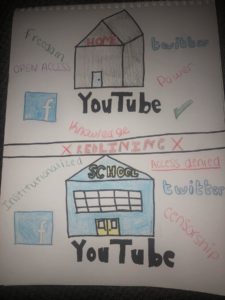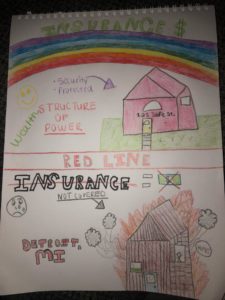Attached is my sketch reflecting the article Digital Redlining, Access, and Privacy by Chris Gilliard and Hugh Culik. On the left is a sketch resembling redlining in a popular and modern aspect (digital redlining). This sketch examples the effect of censorship when browsing the internet on a protected network (schools etc). Sites that are commonly blocked by educational institutions and even governments (China, Iran etc.) are social media websites (Facebook, Twitter etc.), pornographic websites, gambling websites and violent websites. From my own personal experience I remember being in high school and having Facebook being blocked. I remember finding this very annoying and I used a Proxy to get around this censorship.
The sketch on the right reflects redlining in a more serious “hands on” manner. Back as early as just 40 years ago redlining was very prominent hurting inner city and “high risk” communities. Detroit Michigan was a city that was very targeted by redlining. A literal “red line” could drawn around areas on a map which would show the areas targeted by financial institutions such as insurance companies preventing the people that live inside the red line from receiving affordable coverage. In my image it shows a family who has home insurance compared to one who lives in Detroit who does not.
While it is very easy to agree with some types of censorship it is very important to understand what affect this has the people being censored. It is hard to argue a school restricting their internet users from using gambling websites or watching pornography. An issue occurs when students are researching those sites for educational purposes and the students are restricted from their research. I think that is very sad that financial institutions redlined marginalized communities as little as 40 years ago. I think that this type of organized discrimination is still prevalent to this day throughout Aboriginal communities. It is important for us a society to realize the impacts of redlining both digitally and physically.
Personally, I am not a fan of censorship of almost any regard when it can have any negative impact towards education. Any student should have access to ANY information if it is for an educational purpose. While reading this article and the author pointed out that schools are censoring students from potential information it really bothered me as it conflicted with my personal beliefs. “At the community college where we teach — as at many community colleges nationwide — where digital resources are scarce and the students and faculty are embedded in working class realities, digital redlining imposes losses that directly limit the futures of our students”. After reading this point in the article I firmly agreed with Prof. Gillard and as many of you may know reading an article that your views align with is really enjoyable.
Link of the article:
https://www.commonsense.org/education/privacy/blog/digital-redlining-access-privacy
I hope to encourage discussion and look forward to communicating with you all.
Adam


